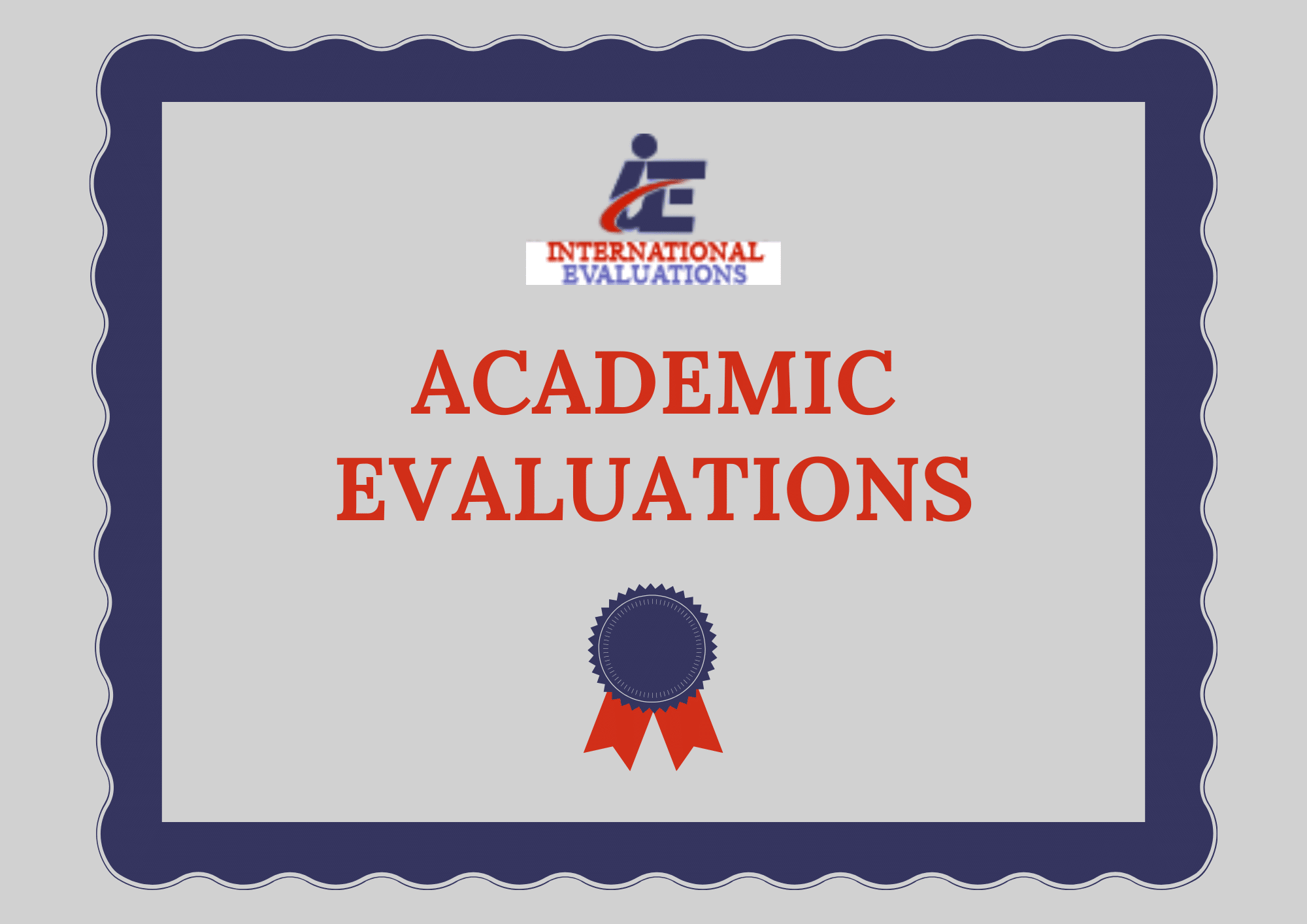Introduction
In today's globalized world, the need for academic credential assessments has actually become progressively crucial. Whether you're an international student looking to advance your research studies or a professional looking for acknowledgment for your qualifications, comprehending the subtleties of scholastic examination is important. This short article explores two prominent types of assessments: Course-by-Course Evaluations and General Equivalency By comparing these approaches, we aim to guide you in making a notified decision about which path suits your needs best.
What is Academic Credential Evaluation?
Academic credential evaluation is a systematic process where instructional credentials are assessed to identify their equivalence in another academic system. This is especially important for people seeking admission to foreign organizations or getting jobs that require particular qualifications.
Why is It Important?
The significance of scholastic credential examination can not be overemphasized. It serves multiple purposes:
Validation of Qualifications: Makes sure that your degrees and diplomas are acknowledged and valued in another country. Facilitating Employment Opportunities: Companies typically require recognition of foreign credentials before considering applicants for positions. Academic Admissions: Many universities mandate assessments to ascertain eligibility for programs.Types of Academic Credential Evaluation Services
There are different services readily available, however they generally fall into two main categories: Course-by-Course Evaluations and General Equivalency Each serves unique functions based upon the candidate's needs.
Course-by-Course Evaluations vs General Equivalency: Picking the Right Path
When it comes to picking between course-by-course examinations and basic equivalency, one need to consider several factors including specific objectives, kind of institution or company requirements, and specific academic backgrounds.
Understanding Course-by-Course Evaluations
A course-by-course examination breaks down each course taken during your studies, examining its equivalence to courses used in the host nation's education system. These examinations offer comprehensive insights into individual subjects, grades got, and credit hours earned.
Benefits of Course-by-Course Evaluations
- Detailed Analysis: Uses a thorough view of all coursework completed. Specificity for Admissions: Ideal for students applying to competitive programs requiring exact course equivalencies. Enhanced Job Prospects: Employers might choose prospects with comprehensive examinations that display their coursework.
Who Ought to Select Course-by-Course Evaluations?
If you're planning to use to graduate programs or specialized accreditation courses that demand particular prerequisites, then a course-by-course examination might be the ideal choice.
What is General Equivalency?
On the other hand, basic equivalency assesses a degree or diploma as a whole instead of delving into specific courses. It usually compares an entire educational program versus developed standards in another country.
Advantages of General Equivalency
- Simplified Process: Normally quicker and includes less paperwork compared to course-by-course evaluations. Cost-Effective: Typically more economical due to reduced complexity. Sufficient for A lot of Jobs: Many employers only require proof of degree without needing information on particular coursework.
Who Ought to Select General Equivalency?
If you're taking a look at task chances that do not require accurate course details or if you're requesting additional education that accepts general degrees, then general equivalency may be all you need.
Key Differences Between Course-by-Course Evaluations and General Equivalency
|Criteria|Course-by-Course Evaluations|General Equivalency|| ----------------------------------|-----------------------------------------|----------------------------------------|| Detail Level|High|Low|| Time Required|Longer|Much shorter|| Cost|Higher|Lower|| Purpose|Specific admissions & & employment|General admissions & & work|| Use Case|Graduate programs & & specialized fields|The majority of undergraduate & & basic jobs|
The Role of International Credential Evaluation Services
When browsing through these assessment procedures, it's crucial to engage with reliable global credential assessment services. These companies specialize in examining foreign academic credentials based upon standardized criteria.
Choosing the Right Examination Service Provider
When picking an assessment service provider, think about:
Accreditation: Guarantee they are acknowledged by pertinent authorities. Experience: Try to find companies with significant experience in handling different instructional systems. Customer Reviews: Check reviews from previous customers regarding their experiences.Work Experience Assessment as an Additional Option
In addition to official education assessments, work experience examinations can also play a vital function in developing credentials-- especially when it pertains to employment opportunities abroad.
What is Work Experience Evaluation?
Work experience evaluation assesses your expert background in relation to particular task functions and responsibilities within different industries throughout varying countries.

Importance of Work Experience Evaluation
- Validates useful skills acquired through work. Enhances employability by showcasing real-world applications of knowledge.
How Does It Complement Academic Evaluations?
Pairing work experience evaluation with academic credential assessments can offer a comprehensive introduction that interest employers looking for well-rounded candidates with both theoretical understanding and practical application skills.
Expert Opinion Letter as a Valuable Asset
A professional opinion letter matches both scholastic and work experience examinations by providing professional insight into the credibility and relevance of your credentials based on industry standards.
What is an Expert Viewpoint Letter?
An expert opinion letter functions as a formal file authored by experts who assess your academic background versus market standards.
Benefits consist of:
- Validating non-traditional education paths such as online courses or certifications. Offering customized insights that improve your application package.
FAQs about Credential Evaluation
1. What kind of examination do I need?
It depends on your objectives! If you're making an application for graduate school or specialized tasks https://blogfreely.net/agnathodyi/streamlining-the-complexities-of-international-credential-evaluations requiring particular courses, choose course-by-course assessments. For basic task applications or undergraduate admissions, basic equivalency might suffice.
2. How long does the assessment process take?
Typically, course-by-course assessments take longer due to their detailed nature-- typically a number of weeks-- while basic equivalencies can be completed faster if sufficient documentation is provided.
3. Are there any expenses associated with these evaluations?
Yes! The expenses vary substantially in between suppliers however normally range from $100-$500 depending on the complexity required (course details vs total degree).
4. Can I use one evaluation type for numerous purposes?
While one examination might serve numerous functions (like entering into school and finding a job), ensure it satisfies each entity's requirements; some colleges or employers specify which type they accept!
5. Do I need original files when applying?
Most services will need verified copies; nevertheless, always confirm with the picked evaluator as policies vary throughout organizations!

6. Is it possible to appeal an undesirable assessment?
Yes! If you think there was an error in processing your application - many organizations allow appeals where recorded evidence can support claims!
Conclusion
Navigating through scholastic credential examinations can initially seem daunting; however, comprehending the distinctions in between course-by-course examinations and basic equivalency simplifies this procedure significantly. Each has its special advantages customized towards various requirements-- whether you're going for college admission or pursuing profession opportunities abroad.
As globalization continues its unrelenting advance and more people look for recognition throughout borders, keeping abreast of such evaluative procedures will empower trainees and specialists alike in attaining their goals successfully while improving their employability prospects globally!
Ultimately, whether you choose course-by-course evaluations or go with basic equivalency hinges on individual goals-- the key takeaway being comprehensive research study coupled with notified decision-making will lead you down the right path!